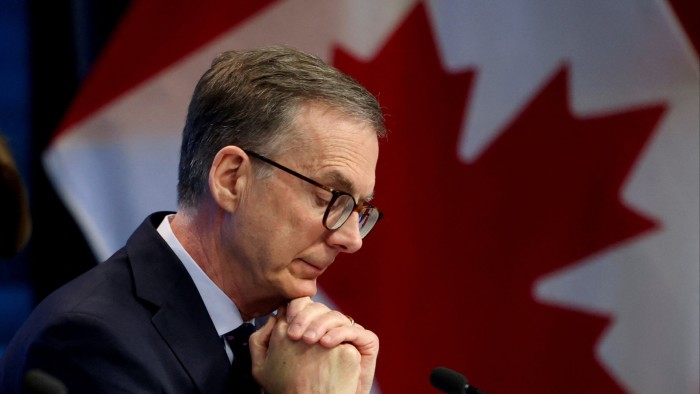Unlock the Editor’s Digest for free
Roula Khalaf, Editor of the FT, selects her favourite stories in this weekly newsletter.
Canada’s central bank has maintained its benchmark interest rate as a precautionary measure against a global economic slowdown stemming from the impact of US tariffs.
The Bank of Canada on Wednesday announced its policy rate would remain at 2.75 per cent.
“The major shift in direction of US trade policy and the unpredictability of tariffs have increased uncertainty, diminished prospects for economic growth and raised inflation expectations,” the bank said in a statement.
“Monetary policy cannot resolve trade uncertainty or offset the impacts of a trade war. What it can and must do is maintain price stability for Canadians,” it added.
The Canadian dollar rose on the announcement, leaving it up around 0.5 per cent against the US dollar in morning trading.
“Uncertainty remains very high, and until the federal election is over, we won’t be getting any more clarity as to where our trade relationship with the US is going,” said Etienne Bordeleau Labrecque, vice-president and portfolio manager at Ninepoint Partners.
Canadians will vote in a general election on April 28 with the threat to the economy from Donald Trump’s tariffs a central concern for voters.
Royal Bank of Canada economist Abbey Xu said Wednesday’s decision was “another close call for policymakers”.
“About 32 per cent of firms surveyed now expected a recession in the next 12 months, up from 15 per cent in the previous quarter,” she said in a note to clients this week.
The decision to hold rates comes as Canada’s inflation rate remains within its 1 per cent to 3 per cent target range. Statistics Canada, the official government data agency, reported that the March rate was 2.3 per cent, down from 2.6 per cent in February.
“The year-over-year slowdown in the all-items CPI was driven by lower prices for travel tours and gasoline in March,” it reported on Tuesday.
Earlier this month Statistics Canada reported that the Canadian economy had shed 33,000 jobs in March, the biggest loss since January 2022.
It said that the unemployment rate rose slightly to 6.7 per cent, from 6.6 per cent in February.
Source link









